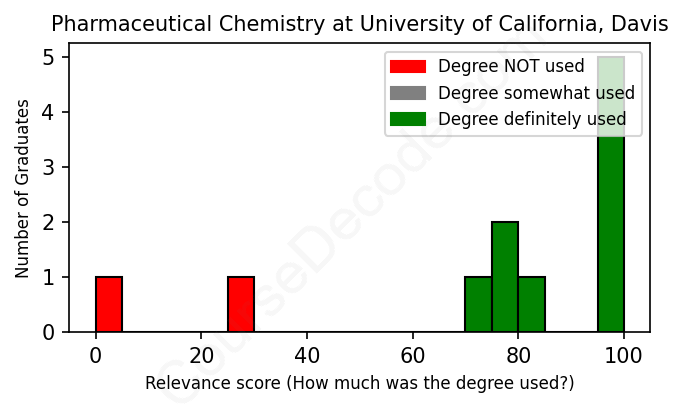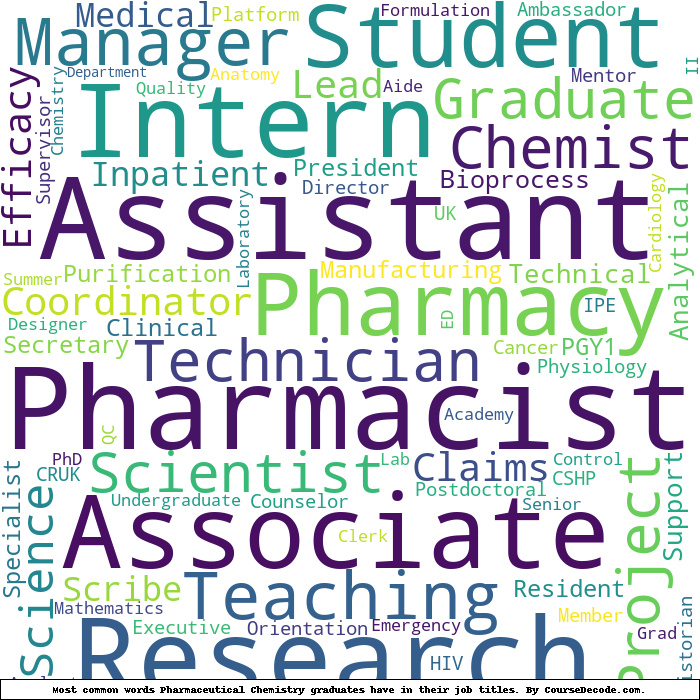
First, some facts. Of the Pharmaceutical Chemistry graduates from University of California, Davis we've analyzed , here's how many have used (or NOT used) their degree in their career:

These are estimates based on AI analysis of 11 LinkedIn profiles (see below).
The verdict? Above average. Overall, with an average relevance score of 74%, Pharmaceutical Chemistry graduates from University of California, Davis have a higher likelihood (+7%) of finding work in this field compared to the average graduate across all fields:
And for comparison, here's the chart for all profiles we've looked at across all degrees.
Also, after graduating, 63% of these graduates have pursued further education other than another Bachelor's degree (such as a Masters degree or other), compared to the average across all profiles of 35%. This suggests you may need more than just a Bachelors degree to be competitive as a Pharmaceutical Chemistry graduate.
See the details:
|
Relevance score: 77% We think this person has gone into a career highly relevant to their degree. We think this person has gone into a career highly relevant to their degree.
DEGREE INFOGraduated in 2019 from University of California, Davis with a Bachelor's degree in Pharmaceutical Chemistry. Also pursued further education since (see below). JOB HISTORY SINCE GRADUATIONEmergency Department Medical Scribe Sutter Health Jul 2019 - Oct 2019 Cardiology Medical Scribe  ScribeAmerica Jan 2020 - May 2020 Anatomy Lab Aide  University of California, Davis - School of Medicine Jan 2020 - Mar 2021 Senior Quality Control Analyst  Genentech Aug 2020 - Aug 2021 QC Associate I  Genentech Aug 2021 - Oct 2022 FURTHER DEGREES DONE SINCE GRADUATINGMaster's degreeBoston University 2022 - 2024 ABOUTNo information provided. |
The top 10 most common jobs done by the graduates we've analyzed (ranked most common to least) are:
When looking at the career paths of graduates from the Pharmaceutical Chemistry program at UC Davis, it’s pretty clear that many of them have landed roles that are directly related to their studies. The most common jobs include positions like Pharmacy Technician, Pharmacist, and various roles as an Intern or Clinical Pharmacist. In these positions, graduates are often using the knowledge they gained during their degree to manage medications, provide patient care, and engage in pharmaceutical practices, making these roles quite relevant to their academic background. For example, jobs like the Bioprocess Manufacturing Purification Technician and the Analytical Chemist require a strong foundation in the chemical processes that are central to pharmaceutical development and production.
However, it's also worth mentioning that not all jobs are closely tied to the core competencies of Pharmaceutical Chemistry. Some graduates have taken on roles in areas like project management or design that, while they may use some skills from their degree, aren't focused on pharmaceutical chemistry itself. For instance, positions like Assistant Manager at Benefit Cosmetics or Lead Designer don't directly leverage the scientific skills learned during their studies. Overall, while there’s a significant amount of relevance in many of the job roles these graduates have pursued, a small percentage have ventured into fields that are less directly connected to pharmaceutical chemistry, showing that there can be diverse applications of their degree, even if those aren’t strictly within the pharmaceutical sciences.
Here is a visual representation of the most common words in job titles for Pharmaceutical Chemistry graduates (this is across all Pharmaceutical Chemistry graduates we've analyzed, not just those who went to University of California, Davis):

When looking at graduates from the University of California, Davis with a degree in Pharmaceutical Chemistry, it's clear that many of them have embarked on successful career paths that are quite relevant to their field. For their first jobs after graduating, several individuals took positions as pharmacy technicians, research associates, or analytical chemists, often working in pharmaceutical companies or healthcare settings. This indicates that many graduates are getting their feet wet in the industry, typically in roles that can leverage their chemistry knowledge and skills. For instance, roles like pharmacy technician serve as a valuable stepping stone into more specialized positions in pharmaceuticals or clinical settings.
Fast forward five to ten years later, and these graduates tend to move up the ranks within the pharmaceutical and healthcare industries. Many have transitioned into roles such as clinical pharmacists, project managers, and even research scientists at esteemed companies, which shows a positive trajectory. For instance, some have climbed the career ladder from intern pharmacists to clinical roles, while others have swung toward project management and research. However, there are a few who have taken on roles outside of traditional pharmaceutical paths, like design or education, which isn’t unusual given the diverse skill set gained during their studies. Overall, it looks like many of these graduates are finding meaningful and relevant careers that align with their Pharmaceutical Chemistry background, showcasing a robust return on their educational investment.
Honestly, a Bachelor’s degree in Pharmaceutical Chemistry, whether at UC Davis or elsewhere, can be pretty challenging. You’re diving deep into both chemistry and biology, which means lots of tough classes, labs, and some serious studying. Expect to tackle complex topics like organic chemistry and biochemistry, and there’s a fair bit of math involved too. It’s definitely not a walk in the park; you’ll need to be dedicated and organized to keep up with the workload. That said, if you’re passionate about the subject and enjoy hands-on experiments, it can also be really rewarding. Just be ready for some late-night study sessions along the way!
Most commonly, in the LinkedIn profiles we've looked at, it takes people 4 years to finish a Bachelor degree in Pharmaceutical Chemistry.
Looking at the job histories of these UC Davis grads, it seems like they're doing pretty well for themselves, especially if we consider the typical salaries in the pharmaceutical and biotech fields. Many of them started in solid entry-level positions and moved up to roles like pharmacists, scientists, and project managers, which usually come with decent paychecks. For instance, those who worked at places like Genentech and Bristol Myers Squibb are likely making good money, as those companies are known for paying their employees well. Even those starting out as pharmacy technicians or interns eventually seem to transition into more specialized roles that can offer better salaries. So overall, it looks like a lot of these folks are on a path to earn a decent living!
Here is a visual representation of the most common words seen in the "about" section of LinkedIn profiles who have a Bachelor degree in Pharmaceutical Chemistry (this is across all Pharmaceutical Chemistry graduates we've analyzed, not just those who went to University of California, Davis). This may or may not be useful:

Here are all colleges offering a Bachelor degree in Pharmaceutical Chemistry (ordered by the average relevance score of their Pharmaceutical Chemistry graduates, best to worst) where we have analyzed at least 10 of their graduates:
| College | Score | Count |
|---|---|---|
 University of California, Davis University of California, Davis
|
74 | 11 |